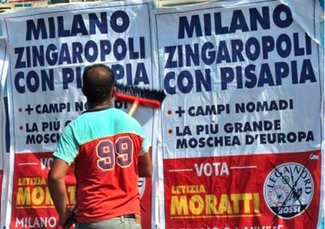Anti-gypsyism in Italy – activists call for action

The Roma and Sinti minorities in Italy suffer every day from all kinds of verbal and physical racist violence which are very rarely reported, writes Roma activist Dijana Pavlovic.
In Naples in 2013 a woman threw acid at a Roma mother and her baby who had irritated her because she used to stand in front of the palace and sell handkerchiefs. The acid disfigured the twenty months old child. Two years ago Roberto Costelli, a former paratrooper, shot at two camper vans that had two Roma families and ten children inside, killing one of the adults. He said "I'm not a racist, I killed him because they soil". There have also been pogroms on Roma camps in Turin and Naples by local people consumed by a collective and hate-driven hysteria: in Turin after the false charge of rape of a young girl, in Naples after the fake kidnapping of a child.
Even in the last few months we have had three cases of violence against Roma and Sinti. On November 4th Paolo Cagna Ninchi, President of Upre Roma in Milan, was physically attacked by a person under his house because his wife (myself) is a "gypsy who goes on television"). Shortly after, on the 22nd of December, an eight year old Roma child was playing football with a friend on a lawn around the Roma camp when the ball hit a nearby sheep.The shepherd came along brandishing a gun and a bamboo cane. He fired a shot into the air to scare the two children, then he chased them for several meters and hit the boy with the cane and gouged out his eye. The child is now blind in one eye.
More recently there is much talk about a video showing two employees of the Lidl supermarket in Follonica locking up two Roma women in a cage in which the supermarket keeps the scraps. While the women scream in fear, the two employees film with their phone as they mock her and then they post the video on Facebook getting 200,000 views, more than 30,000 "likes" and comments, including ones that incite violence. Matteo Salvini, Secretary of the Northern League political party, even republishes the post asking "what has to shout this unfortunate" and then launches a Twitter hashtag “#ruspa” (#caterpillar) which is the symbol for those campaigning for the evictions of Roma camps.
One of the things that strikes me about these cases are the feeble condemnations of racist attacks by the Italian government institutions. The second thing that worries me is that in the public debate on one side there are "youngsters or workers” who did wrong to post the video on web and on the other side there are "gypsies" or "thieves". The third thing that worries is that when it comes to Roma and Sinti, the public opinion is no longer able to recognize and condemn clear acts of violence, even when it is men assaulting women and children.
It’s clear that Italian society is deeply afflicted by racism against Roma and Sinti, a racism that comes in the forms of physical violence as well as verbal. Since 2008, anti-gypsyism propaganda has permeated Italian media and politics and has resulted in the dehumanization of our community. Even "good people", mothers and fathers, going to church, invoking law and order, are no more able to see the face of a terrified woman abused by two men, but only a "gypsy thief". Nor can they see a child who has lost one eye because he played with a ball, but only a “gypsy boy”. And a "gypsy thief" or a “gypsy boy” should have no compassion in their eyes.
For this, besides the punishment due to those who have committed this crimes of hate, we ask the guarantor of the Italian Constitution, the President of the Republic and the Presidents of the Parliament, to be aware of the dangers of this situation and to promote joint discussions on how to counter the anti-gypsyism and its effects on our society.
We also ask the Council of Europe and the European Commission and all international institutions to intervene through institutional channels on the Italian government to commit itself to fight against anti-gypsyism as a condition for social inclusion policies in this country.
Finally, we ask the order of the journalists to take note of the responsibility of the media for anti-gypsyism propaganda, tolerated for a long time, and take action due against those who spread false information on a daily basis instigating hate and fomenting fear with consequences that not only harm Roma and Sinti communities but that also poison the entire society.
Dijana Pavlovic, Consulta Rom e Sinti di Milano; Santino Spinelli, associazione FederArteRom; Nazzareno Guarnieri, Fondazione Romanì Italia; Paolo Cagna Nichi, associazione Upre Roma; Davide Casadio, Federazione Rom e Sinti Insieme; Gennaro Spinelli, associazione FutuRom; Saska Jovanovic associazione Romni Onlus; Concetta Sarachella, Rowni-Roma Women Network Italy; Giorgio Bezzecchi, Cooperativa Romano Drom e Museo del viaggio “Fabrizio De Andre”; Vladimiro Torre, associazione Them Romanò; Ernesto Grandini, associazione Sinti Italiani di Prato; Samir Alija e Miguel Lebbiati Fiorello, associazione New Romalen; Elvis Ferrari, Associazione Sinti Italiani di Piacenza; Carlo Berini, Articolo 3 Osservatorio sulle discriminazioni; Davide Gabrieli, Associazione Sucar Drom; Claudio Gennari, Associazione Sinti Italiani di Vicenza; Yuri Del Bar, Istituto di Cultura Sinta; Diego Grisetti, Associazione Sinti Italiani di Reggio Emilia; Bernardino Torsi, Cooperativa Labatarpe; Cen Rinaldi, Associazione Sinti Italiani di Verona; Jose Bianchi, Associazione Sinti Italiani di Busto Arsizio; Tomas Fulli, Associazione Sinti Italiani di Bologna; Luca Bravi, Radio Cora; Marco Brazzoduro, associazione Cittadinanza e Minoranze; Demir Mustafa, associazione Amalipe Romano; Simonetta Malinverno Associazione Amici di Via di Django; Alexander Valentino, Forum Campania Rom.